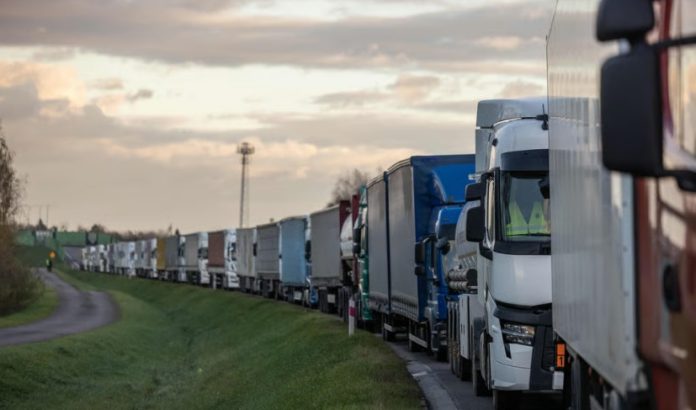A protest by Polish hauliers has escalated into a 24-hour blockade of a fourth border crossing with Ukraine, further exacerbating tensions over reciprocal transport rules that were broken shortly after the war in Ukraine began, Polish media reported.
Polish truckers complain that the cancellation of the reciprocal entry permit system agreed with the EU has put them in the difficult position of being unable to compete with Ukrainian companies, which are not obliged to comply with EU climate regulations and have lower operating costs.
Poland intends to raise the protesters’ demands in Brussels next week, asking the European Union to discuss the implications of the agreement with Ukraine for the stability of the EU transport market.
On 6 November, Polish truckers blocked three border crossings, allowing only one Ukrainian truck per hour through (excluding trucks carrying perishable goods, humanitarian and military aid and emergencies).
The protest later spread to the Medyka crossing, which was initially blocked only from 9 am to 8 pm. However, since Monday, the Medyka crossing has also been blocked around the clock. According to the Polish Border Guard Service, the waiting time to leave Poland through the Medyka crossing this morning was 73 hours, which is significantly shorter than the waiting times reported by Ukrainian lorry drivers at the other three crossings.
While the border service does not publish exact figures for other border crossing points, where queues stretch more than 30 kilometres into Poland, Ukrainian drivers report waiting, often in freezing temperatures, for more than a dozen days.
Last week, Ukraine announced the evacuation of its drivers, who consider themselves “hostages” of the protesters, from the Polish border and asked the EU to set up a team to monitor the protests. Ukraine urged the EU to monitor the situation on the border with Poland, which Polish truckers are blocking in protest against what they believe to be unfair competition.
Poland’s Ministry of Infrastructure said this week that outgoing minister Adam Adamczyk had asked Ukraine to abolish the requirement for Polish drivers to sign up for an electronic queue – another demand of Polish trucking companies. Polish truckers consider the system unfair to foreigners, who have to wait for permission to leave Ukraine in car parks while Ukrainians wait their turn at home. Jan Buczek of Poland’s largest hauliers’ organisation, the Polish International Truckers’ Association (ZMPD), who joined the protest last week, said:
“There are drivers stuck on both sides of the border, deprived of drinking water, meals, fuel or access to sanitary facilities. The situation is also increasing tensions between the desperate drivers waiting in line and the protesters.”
Buczek sent an appeal to Polish President Andrzej Duda calling for immediate mediation with the Ukrainian president.
Adamczyk, who was replaced on Monday by Alvin Gajadhur to form a new – most likely interim – government, also asked EU Transport Commissioner Adina Valean to set up a committee to analyse the impact of the deal on the EU’s pre-war rules on the road transport market.
The issue is likely to be discussed at the EU Transport Council in Brussels on Monday, 4 December. Poland wants one of the main topics of the talks to be a discussion of the consequences of the agreement concluded with Ukraine. The infrastructure ministry said in a press release on Monday:
“There is a need on the part of the EU authorities to evaluate the effects that have arisen as a result of the implementation of the agreement between Ukraine and the EU, as well as changes to its content, which are necessary to preserve the stability of the transport market in individual countries of the community.”
Meanwhile, the new minister plans to meet protesters at the border on Tuesday or Wednesday, government spokesman Piotr Müller said.
